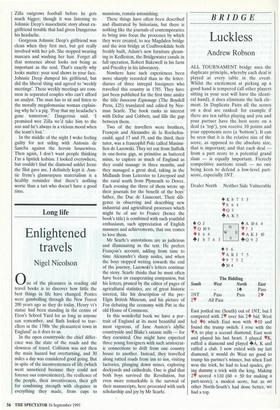Long life
Enlightened travels
Nigel Nicolson
0 ne of the pleasures in reading old travel books is to discover how little the best things in life have changed. Ponies were gambolling through the New Forest 200 years ago as they do today, Henry vr's statue had been standing in the centre of Eton's School Yard for as long as anyone can remember, and Bath looked to trav- ellers in the 1780s 'the pleasantest town in England' as it does to us.
In the open countryside the chief differ- ence was the state of the roads and the slowness of travel. Collision was not then the main hazard but overturning, and 30 miles a day was considered good going. But in spite of the inconveniences of life (which went unnoticed because they could not foresee our conveniences), the resilience of the people, their inventiveness, their gift for combining strength with elegance in everything they made, from cups to mansions, remain astonishing.
These things have often been described and illustrated by historians, but there is nothing like the journals of contemporaries to bring into focus the processes by which they were created, to see Magdalen bridge and the iron bridge at Coalbrookdale both freshly built, Adam's new furniture gleam- ing in Kedleston, the Bridgewater canals in full operation, Robert Bakewell in his farm and Priestley in his laboratory.
Nowhere have such experiences been more sharply recorded than in the letter- diaries of three intrepid foreigners who travelled this country in 1785. They have just been published for the first time under the title Innocent Espionage (The Boydell Press, £25) translated and edited by Nor- man Scarfe. The book ranks in interest with Defoe and Cobbett, and fills the gap between them.
Two of the travellers were brothers, Francois and Alexandre de la Rochefou- cauld, aged 17 and 19, and the third, their tutor, was a francophil Pole called Maximi- lien de Lazowski. They set out from Suffolk in one-horse gigs, as primitive as battered minis, to explore as much of England as they could manage in three months, and they managed a great deal, taking in the Midlands from Leicester to Liverpool and the rural south from Plymouth to Dover.
Each evening the three of them wrote up their journals for the benefit of the boys' father, the Duc de Liancourt. Their dili- gence in observing and describing new industrial and agricultural processes which might be of use to France (hence the book's title) is combined with such youthful enthusiasm, such appreciation of English manners and achievements, that one comes to love them.
Mr Scarfe's annotations are as judicious and illuminating as the text. He prefers Francois's account, adding from time to time Alexandre's sharp asides, and when the boys stopped writing towards the end of the journey, Lazowski's letters continue the story. Scarfe thinks that he must often have been an exasperating companion, but his letters, pruned by the editor of pages of agricultural statistics, are of great historic interest, like his description of the pre- Elgin British Museum, and his picture of Fox debating the economy with Pitt in the old House of Commons.
In this wonderful book we have a por- trait of England at its most beautiful and most vigorous, of Jane Austen's idyllic countryside and Blake's satanic mills — for they coexisted. One might have expected three young foreigners with such aristocrat- ic connections to drift from one country house to another. Instead, they travelled along rutted roads from inn to inn, visiting factories, plunging down mines, exploring dockyards and cathedrals. One is glad that both boys survived the Revolution, but even more remarkable is the survival of their manuscripts, here presented with such scholarship and joy by Mr Scarfe.


































































 Previous page
Previous page